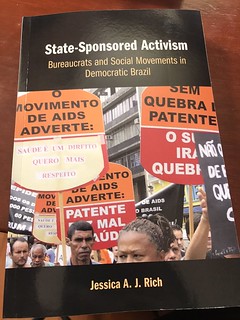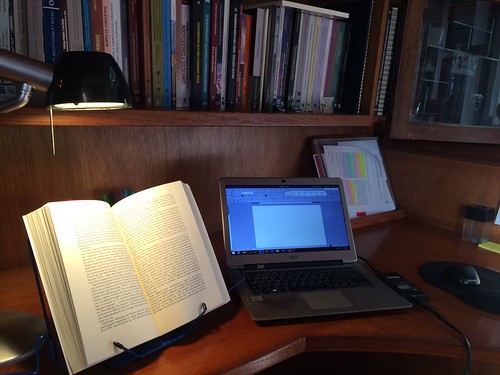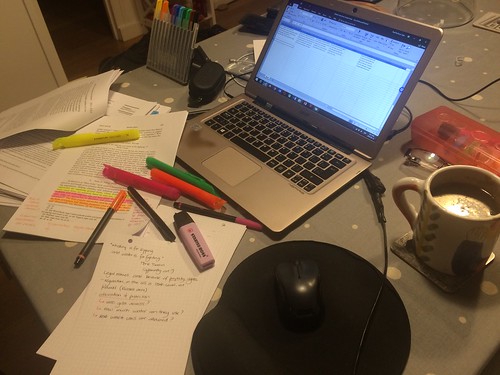One of the first things I teach my students *and* my thesis advisees is how to develop a writing practice.
Perhaps the most challenging thing in the Hidden Curriculum of being a graduate students, one of the many things *I* wasn’t taught, was the idea of a writing practice, the “how to” of crafting paragraphs and creating papers and book chapters, and dissertation components. Nobody taught me how to do this. What is the process by which graduate students can learn to systematically put words down and produce texts?
Having a writing practice doesn’t mean that you write every day. Yes, for the better part of two decades, I’ve been a proponent and fan (not a tyrant, though!) of writing every single day of the work week.
But guess what? I’ve also gotten sick. I’ve travelled. My parents have required care. All of the above has made it extremely challenging for me to sustain 2 hours of daily researching, reading, thinking and writing, as I normally would do.
As I’ve written before, a sustainable writing practice is one where the process of producing words and putting them on the page/screen is part of a workflow. Something that can be done with less friction than we normally face on an everyday basis.
Perhaps your writing happens once a week/biweekly.
I’ve written about all three elements of my proposed sustainable writing practice, and you can find those posts on my blog. But here they are for your perusal.
1. A system that works for you.
I’m an early morning riser. My ex-boyfriend was a super-early-morning person. I had to change my habits. Once I realized he wasn’t going to become a night owl, I slowly switched to a morning schedule that would give me 2 hours of writing alone and the remainder of the morning (until we both left for work) available to spend with him. So I moved to a 4:00am wake up time. Writing very early in the morning (4-6 am normally, when my body allows, 7-8 am when I’m tired or I’ve been travelling) is what makes my life easier.
I am NOT advocating for YOU to go to that schedule. I am saying that you need to find what works best FOR YOU. Which time slot you can use to put some words down, to read materials that you need to absorb in order to write.
2. A structure of work that is feasible.
I would pay good money to be able to just send my thoughts telepathically to the page. This device hasn’t happened yet, so I have learned to adapt.
For me, the time I block to write is TO WRITE. I do research, think, outline, draft, create topic sentences. Like pretty much every single faculty member I know, I have to read dissertation and theses’ drafts, prepare lectures, write papers, travel to conferences, do care work, etc.
The reason why I write so early in the morning is also that it makes it feasible for me to THINK and LEARN and WRITE. Every single time I’ve broken up with a guy, it has been late at night, when we are both tired, and not thinking very clearly. I am a morning person. A VERY EARLY MORNING person. I think well up until about 2pm. Anything I do after noon-2pm should be stuff that doesn’t require me to think clearly.
I protect my writing time fiercely. You’ll see me pushing for meetings AFTER 11 in the morning. For some reason, people seem to really like to take meetings in the morning. That’s MY writing time. So I compromise. I don’t say “no meetings before 4pm”, I just say “any time after 11am is good for me”.
I also prefer to teach in the afternoons. But this isn’t always possible. So I delay teaching as late as possible within the reasonable limits of what my university requires (usually my classes start at 11 am or 4pm, but I’ve also been known to teach at 8am).
Teaching in the afternoon is easier for me.
But more importantly, I think the most important element of a sustainable writing practice is item # 3:
3. A piece of writing output that is doable.
So, turns out that I am not able to write for as long as I would like to (2 hours per day, 5 days a week). Well, I’ll write whatever I can take. And I won’t stress about it: I’ll do it MEMO BY MEMO. I borrowed the Memo-Writing practice from qualitative methods (I only learned what qualitative research methods entailed until I did my PhD – thank you UBC School of Nursing and UBC School of Social Work – I am a political scientist and a human geographer who first learned how to conduct qualitative inquiry from nurses and social workers).
Now that you know what I consider the elements of a sustainable writing practice, here are (in my view) the 3 key habits that you need to implement on a regular basis in order to DEVELOP A SUSTAINABLE WRITING PRACTICE:
1. Start small.
2. Break down the work in manageable pieces.
3. Make of writing part of your daily routine and integrate it into your workflow.
I will explain what I mean by each one of these habits:
1. START SMALL:
I don’t set out to finish a chapter, an article, not even a section.
I set out to write a certain number of words or a specific amount of time. When I teach learners this method, I encourage them to focus on 125 words, 15 minutes. Focusing on a small target or goal makes it much easier to create a habit of producing a specific number of words over a certain period of time.
2. BREAK DOWN THE WORK IN MANAGEABLE PIECES
Do I need to finish revisions to a chapter this week? Yes.
Can I do them in one day? Unlikely.
BUT I can focus on writing a memo that addresses 1-2 comments from the editors, breaking these into smaller pieces. Being able to systematically decompose an entire task or work package into smaller pieces makes it easier to focus JUST on one of those tasks. Remaining focused on a small piece of work also makes slow-but-steady progress feasible.
3. INTEGRATE WRITING INTO YOUR DAILY ROUTINE/WORKFLOW
I am a Virgo, Type A, Upholder. I have my Moon in Virgo, my Venus in Virgo, and my ascent in Virgo. I’m the Virgo-est Virgo to have ever Virgo-ed. Organization and structure are the backbone of my life.
Do I face challenges in my daily life and do I need to deal with what comes my way in unexpected ways? Heck, of course I do. But disorganization really screws up my life. I need structure. Even within the whirlwind that my life is, I have to keep things organized and under control.
With my graduate students (I no longer supervise undergrads) I always try to show them the benefits of a structured daily routine. I developed my writing, reading and research habits well before I got to graduate school. But it was during the PhD that I found lack of structure most challenging.
When I started my PhD, I quickly realized that grad school is VERY unstructured. For someone like me, lack of structure is extremely disorienting. So I forced myself to retain structure: I took graduate school as a job, I worked at my desk on campus, etc.
My hope is that this blog post and those linked throughout will be useful to those of you who are seeking to develop a sustainable writing practice.






























Recent Comments